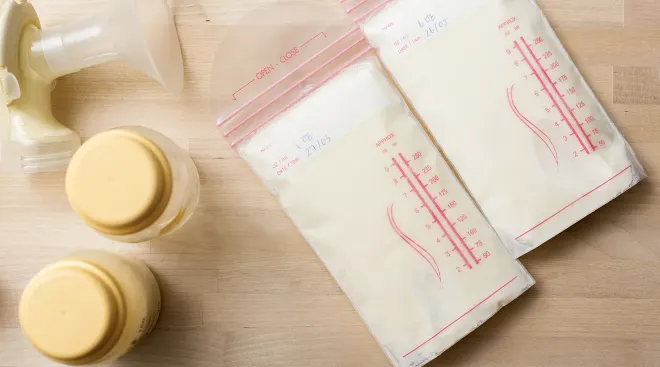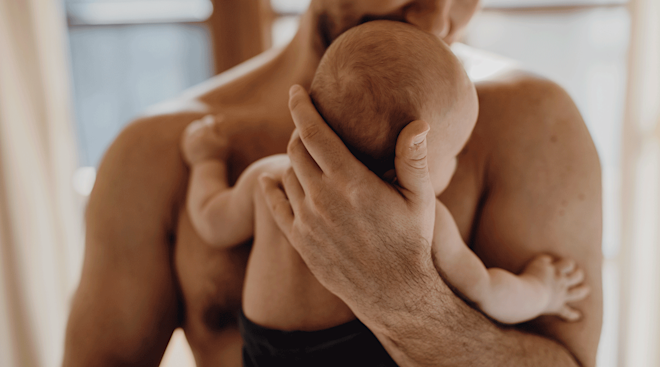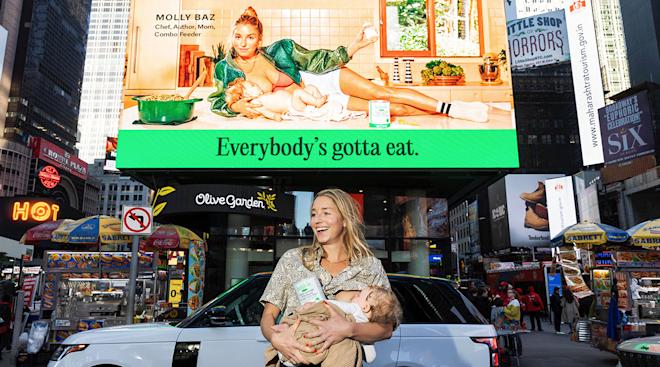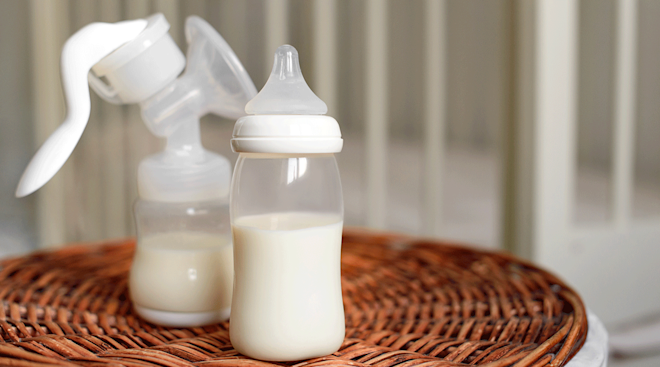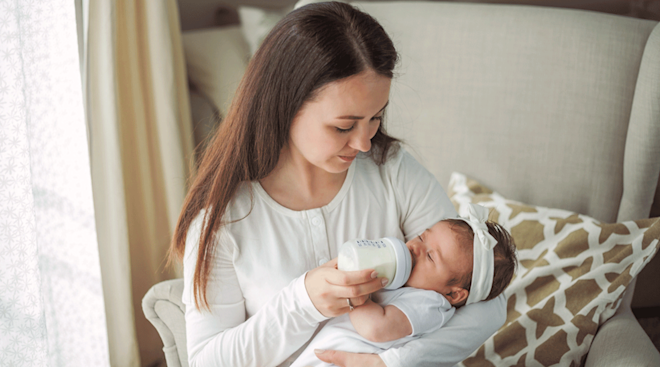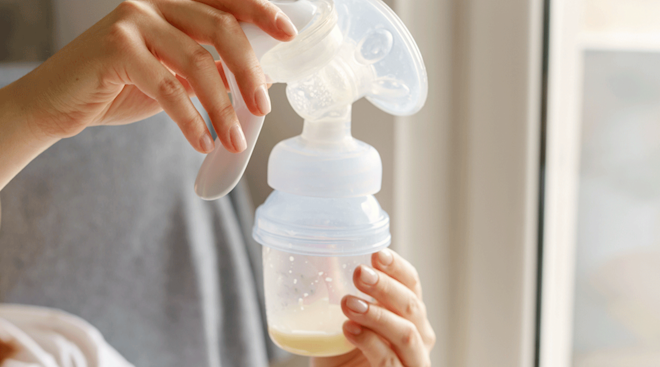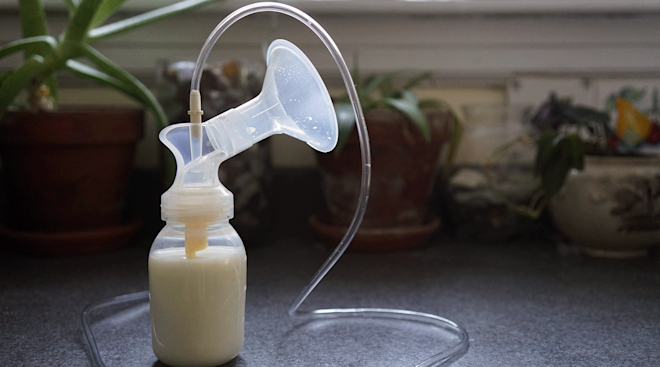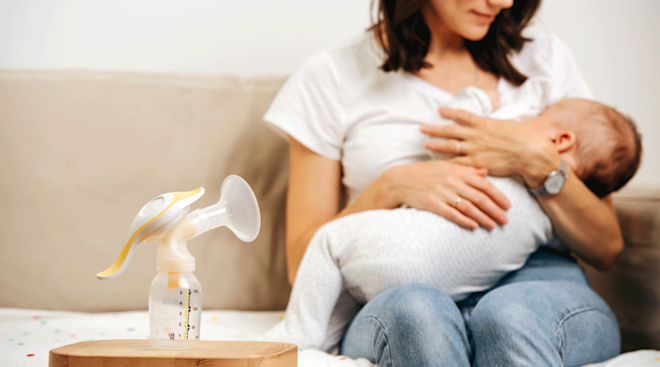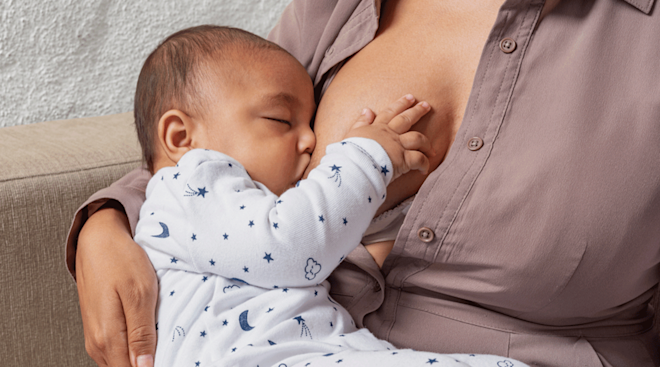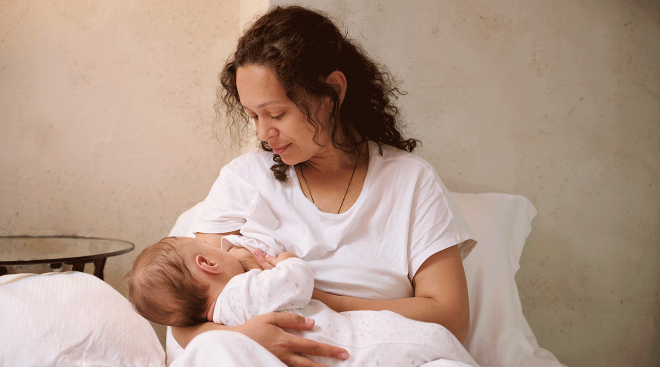Top 13 Benefits of Breastfeeding
When it comes to feeding your baby, trust in your decision for what’s best for you and your family. Some moms nurse their infants, some offer formula and some combo-feed. Moreover, plenty of moms choose not to breastfeed, and others—for a variety of possible reasons—simply can’t. At the end of the day, fed is best. Still, there are some powerful benefits of breastfeeding that are important to know about. The American Academy of Pediatrics (AAP) recommends exclusively breastfeeding for six months, then gradually adding in solid foods while continuing to nurse—if mutually desired—through baby’s first two years and beyond.
There’s a host of breastfeeding benefits for your child, from boosting baby’s immune system to preventing food allergies and warding off acute illnesses down the road. Our bodies are specifically designed to produce nutrient-rich food for baby. “Breastfeeding is a biological norm,” says Lisa Fortin, IBCLC, a lactation consultant and member of the International Board of Lactation Consultant Examiners (IBLCE), a global organization that certifies practitioners in lactation and breastfeeding care. “Like any other mammal, we’re programmed to nurse soon after birth, making breastfeeding just plain normal.”
But beyond the breastfeeding benefits for baby, there are also real pros for you. Read on to learn about the emotional, economic and health benefits of breastfeeding for both you and your little one.
Study after study shows there are immense benefits of breast milk for baby. The common thread? Breastfeeding helps keep your little one healthy, from infanthood into childhood and beyond. Here, a breakdown of the specific health benefits of breastfeeding for babies:
Boosts baby’s immune system
The benefits of breast milk are extensive. Breast milk contains the ideal mix of antibodies to build baby’s immune system, making breastfed babies less likely to have ear infections, respiratory illness, allergies, stomach bugs and colds. “A breastfed baby will receive their immune system from their mom, from the first drops of rich colostrum to the disease-specific antibodies Mom will make,” Fortin says. In other words: If you encounter a nasty bug, your immune system will create the right antibodies to squash it, and then share them with baby via breast milk. Plus, baby’s saliva on the nipple also sends a signal to your body to produce antibodies. “It fires up antibodies in the breast milk to specifically meet baby’s needs,” agrees Leigh Anne O’Connor, IBCLC, LCCE, a board-certified lactation consultant based in New York City with over 20 years of experience.
Furthermore, it reduces the risk of necrotizing enterocolitis, a serious gastrointestinal infection that typically affects preterm babies, says Nicole Peluso, IBCLC, CD, CAHPE, a board certified lactation consultant and manager of lactation services and education for Aeroflow Breastpumps. “It’s the number one cause of death of premature babies, and it’s almost non-existent in babies who have 100 percent breast milk as a diet,” O’Connor adds.
Promotes overall lifelong health benefits
According to the AAP, breastfeeding can decrease baby’s risk of sudden infant death syndrome (SIDS) by up to 64 percent. But, beyond infancy, the health benefits of breastfeeding for baby can continue into adulthood, helping to reduce your child’s risk of diabetes and inflammatory bowel disease later in life. The AAP also notes breastfeeding can cut baby’s risk of developing asthma, lower respiratory tract infections, eczema Crohn’s and ulcerative colitis, leukemia and other types of cancer. In fact, a study published in the Journal of Human Lactation found high levels of cancer-fighting proteins (called TNF-related apoptosis inducing ligand) in human milk, which provides better protection against cancer as well as some autoimmune diseases.
Helps kids maintain a healthy weight
“We know that children and adults who have been breastfed are more likely to be of a normal weight and body composition,” Fortin says. “Feeding at the breast—even more so than drinking breast milk from a bottle—allows babies from the very earliest age to regulate their food intake. They can eat when they’re hungry, take a break if they desire and stop when they’re satiated,” helping to instill healthy eating habits that can have a lasting impact. Furthermore, the AAP and several studies also note that breastfed babies have a reduced risk of obesity later on in life.
Improves brain development
Breastfeeding not only provides baby with important health benefits, but it also can help boost baby’s cognitive development. A 2008 study published in JAMA Psychiatry followed nearly 14,000 children over the course of six and a half years, and found that the kids who were exclusively breastfed had higher IQs than those who weren’t (about 6 percent higher, on average). Those who had been breastfed also received better test scores and higher ratings from their teachers. The explanation? As Fontin tells us, certain ingredients in breast milk (including a unique fatty acid profile) are crucial to brain development, and no one has been able to perfectly replicate them in baby formula thus far.
Can prevent the need for braces
The longer you breastfeed, the less likely baby is to suffer from malocclusion—a fancy word for misaligned teeth. According to a 2007 study from Brazil, breastfeeding baby for at least nine months is one of the most effective ways to prevent baby’s teeth from becoming crooked. That’s because a mother’s nipple is soft and pliant. While silicone or latex nipples on baby bottles have come quite a long way, they still don’t quite replicate the effect. Along with crooked teeth, the AAP also notes breastfeeding can reduce baby’s risk of tooth decay and other orthodontic issues later in life.
There are breastfeeding benefits for baby galore—but nursing isn’t just good for babies. The benefits of breastfeeding for Mom are just as plentiful. Below, find out all the ways moms can benefit from breastfeeding.
Speeds up the postpartum healing process
According to the AAP, breastfeeding can support postpartum recovery by releasing hormones (like oxytocin, the love hormone) that reduce postpartum bleeding and help the uterus shrink back to its normal size more quickly. Plus, because breastfeeding burns extra calories, you may be able to lose weight while breastfeeding at a faster rate (if that’s your goal). It “promotes a healthy and balanced metabolic rate after birth,” Peluso says. (Keep in mind, though, that your postpartum body is beautiful as it is!)
Can support mental health postpartum
The Centers for Disease Control and Prevention (CDC) notes that postpartum depression affects around 15 percent of women (if not more)—but breastfeeding may be one way to reduce it, O’Connor notes. A 2021 study from researchers at Florida Atlantic University found that women who were breastfeeding showed a significantly lower risk of postpartum depression than women who were not breastfeeding. Plus, the longer the women breastfed, the more their risk of decreased. Another 2022 study found that, overall, breastfeeding was associated with improved maternal mental health outcomes. There’s a caveat though: It’s important to note that many of these benefits may only occur if breastfeeding—which can be notoriously difficult and challenging on a Mom’s mental health—is going well, says Peluso.
May help you bond with baby faster
Breastfeeding baby is a highly intimate journey for Mom and baby and can help you bond. “Responding early to baby sets up a trust and understanding between mom and baby that is critical for the building of a long-term, healthy relationship,” Peluso says. Lilly Hubschman-Shahar, NP, IBCLC, a certified lactation consultant and board-certified neonatal nurse practitioner, agrees: “The more time you spend with baby, the more attention you pay to baby, the more you watch their feeding cues and other behavior signs, the better you’re going to know baby, which I think contributes to maternal confidence.” And a boost to your confidence as a new parent is always a good thing!
Lowers your risk of diseases
“It’s not just about bonding with baby. Breastfeeding really is a public health issue,” Hubschman says. “The longer you breastfeed, the more you’ll reduce your risk of breast cancer and ovarian cancer, heart disease and type 2 diabetes.” In fact, moms who breastfed were 1.5 times less likely to be diagnosed with breast cancer than those who didn’t in a 2012 study from Columbia University—and the more children they breastfed, the lower their risk became. O’Connor also says that breastfeeding reduces Mom’s risk of osteoporosis and uterine cancer.
Saves you money and prep time
One of the best breastfeeding benefits? The milk is free (at least financially—blood, sweat and tears not included)! Formula, however, is not. Plus, as we saw in 2022, supply chain issues can cause formula shortages on a local, state-wide or even national level. Not to mention that when you breastfeed, baby’s food is always ready: It requires no preparation, is on-hand wherever you go and comes out at the perfect temperature every time. (That said, breastfeeding isn’t for everyone. As we said before, fed is best.)
When it comes down to it, most moms want to breastfeed. The CDC reports that 83 percent of women start breastfeeding after childbirth. But that figure drops to 56 percent at the six-month mark, and down to 36 percent at 12 months—and there are several reasons for this. One of the biggest ones is the lack of a federal paid family leave policy. “Women in this country get no time for breastfeeding, no time off from work, no maternity leave,” O’Connor says. She also says there’s an abundance of unvetted information online and “rules” that overwhelm, intimidate and can ultimately impede mothers desire to breastfeed. Plus, outdated societal norms may also lead some women to stop feeling comfortable breastfeeding their child at all. “I discourage people from hiding it,” O’Connor says. “Think of yourself as being a role model and normalizing breastfeeding instead.”
However, there are some important long-term benefits of breastfeeding at one year, two years and beyond. Here’s what you need to know:
Continues to strengthen baby’s health
After six months, babies need supplemental nutrition beyond breast milk. But that doesn’t mean that breastfeeding no longer benefits your child—or you. “Every drop counts,” Hubschman-Shahar says, noting that all the health benefits that are true of breastfeeding up to one year are still true after.
Saves on sick days
Breastfeeding can strengthen baby’s immune system, protecting your child against a range of diseases and infections—not only while they’re breastfeeding, but in some cases long after they’ve weaned, the AAP says. The less baby is sick, the less time you have to take off work, Peluso says—a particular bonus if your company doesn’t offer a ton of sick days.
Helps ensure that your child is happy and confident
The benefits of breastfeeding after a year or two extend to baby’s emotional health as well as physical. As baby moves into toddlerhood, they go through a lot of milestones and learn to cope with many big feelings. Through it all, breastfeeding can help offer comfort and a sense of security, both the AAP and O’Connor note. “If you have a toddler who’s learning to walk, and they fall down and skin their knee, one of the best things you can do is pick them up and nurse them,” she says, adding that nursing is a great way to calm down toddlers when they’re having a hard time or throwing a tantrum
Both the AAP and World Health Organization (WHO) now recommend breastfeeding baby until age 2 and beyond—as long as both Mom and baby want to. Almost all of the benefits listed above still apply for extended breastfeeding for both Mom and baby. In fact, according to the AAP, there is no known point at which breast milk becomes nutritionally negligible.
Of course, while the benefits of breast milk are plenty, and breastfeeding is a biologically natural behavior, it doesn’t always come easily to new moms. Fontin’s message to moms who are struggling: Don’t be discouraged! “It’s amazing what moms will go through. I’ve personally worked with women who have jumped major hurdles—adoption, preterm twins, breast reduction surgery—and succeeded in their breastfeeding goals,” she says. “But good lactation support from a trained professional is key.” Fontin recommends visiting the La Leche League website, where you can connect with IBCLC-certified lactation consultants and knowledgeable volunteers.
“Mothers need the support of knowledgeable hospital staff, compassionate lactation professionals and encouragement from their partners, mothers, sisters, aunts, friends and places of employment,” Hubschman-Shahar says. “The wider population needs to welcome and rejoice women nursing their babies.”
Along with expert guidance and a breadth of support, O’Connor also advises new and breastfeeding moms to trust their judgment. “Nobody seems to be able to trust their instincts anymore because there’s so much information,” she says. “Let baby be your spirit guide into parenting.”
Please note: The Bump and the materials and information it contains are not intended to, and do not constitute, medical or other health advice or diagnosis and should not be used as such. You should always consult with a qualified physician or health professional about your specific circumstances.
Plus, more from The Bump:
Lisa Fortin, IBCLC, LLLL, is a certified lactation consultant and member of the International Board of Lactation Consultant Examiners (IBLCE), a global organization that certifies practitioners in lactation and breastfeeding care. She is also a former La Leche League Leader.
Lilly Hubschman-Shahar, NNP-BC, IBCLC, NNP-BC, IBCLC, is a certified lactation consultant and board-certified neonatal nurse practitioner, and the founder of Mother's Individualized Lactation Consulting. She earned her Master's degree as a neonatal nurse practitioner from Columbia University.
Nicole Peluso, IBCLC, CD, CAHPE, is a board certified lactation consultant, parenting educator, birth and postpartum doula, La Leche League Leader and manager of lactation services and education for Aeroflow Breastpumps. She has been in the field of lactation for over 20 years and is the mother of four children.
Leigh Anne O’Connor, IBCLC, LCCE, is a board-certified lactation consultant based in New York City with over 20 years of experience. She has served on the Board of the New York Lactation Consultant Association and has been an accredited La Leche League Leader for over two decades. O’Connor is also a Lamaze Certified Childbirth Educator.
Healthy Children (American Academy of Pediatrics), Breastfeeding: AAP Policy Explained, July 2022
Centers for Disease Control and Prevention, Breastfeeding Benefits Both Baby and Mom, July 2023
National Institute of Health, What are the benefits of breastfeeding?, July 2018
The American Journal of Clinical Nutrition, Does breastfeeding influence risk of type 2 diabetes in later life? A quantitative analysis of published evidence, November 2006
The American Journal of Clinical Nutrition, Breastfeeding and risk of inflammatory bowel disease: a systematic review with meta-analysis, November 2004
Journal of Human Lactation, Human Colostrum and Breast Milk Contain High Levels of TNF-Related Apoptosis-Inducing Ligand (TRAIL), April 2012 Frontiers in Immunology, Human Breast Milk: From Food to Active Immune Response With Disease Protection in Infants and Mothers, April 2022
JAMA Pediatrics, Breastfeeding as Obesity Prevention, August 2011
JAMA Psychiatry, Breastfeeding and Child Cognitive Development, May 2008
Revista de Saúde Pública, Effects of breastfeeding and sucking habits on malocclusion in a birth cohort study, June 2007
Centers for Disease Control and Prevention, Depression During and After Pregnancy, May 2023
Public Health Nursing, The significance of breastfeeding practices on postpartum depression risk, September 2021
Journal of Women’s Health, The Effects of Breastfeeding on Maternal Mental Health: A Systematic Review, June 2022
Health Psychology, Breast-feeding is associated with reduced perceived stress and negative mood in mothers, March 2002
Annual AACR International Conference on Frontiers in Cancer Prevention Research, Study shows breastfeeding reduced risk for ER/PR-negative breast cancer, October 2012
Pharmaceutical Technology, First-in-human trial of Alpha 1H demonstrates a novel approach to bladder cancer treatment, July 2019
Healthy Children (American Academy of Pediatrics), Breastfeeding Benefits Your Baby’s Immune System, July 2022
Healthy Children (American Academy of Pediatrics), Continuing Breastfeeding Beyond The First Year, November 2009
World Health Organization, Breastfeeding, 2023
Navigate forward to interact with the calendar and select a date. Press the question mark key to get the keyboard shortcuts for changing dates.

































